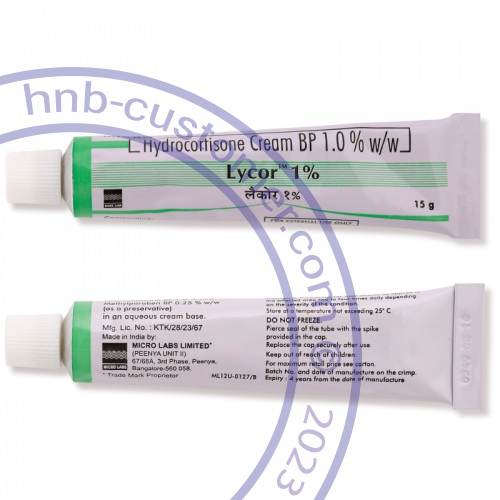

Brand(s):
- Lycor
Manufacturer:
- Micro Labs Ltd
Disease(s):
- Inflammation Of The Skin / Allergy / Eczema / Psoriasis
- We can ship our products to any location worldwide
- Enjoy complete anonymity and robust data security measures
- Exclusive certified products at compelling prices
- Skip the hassle of long queues; get your medicines hassle-free
Cortaid
hydrocortisone
| Package | Per tube | Price | Savings | Order |
|---|---|---|---|---|
|
5 tubes
|
$ 9.99
|
$ 49.95 $ 9.99 Per tube
|
$ 24.80
|
|
|
4 tubes
|
$ 10.99
|
$ 43.95 $ 10.99 Per tube
|
$ 15.85
|
|
|
3 tubes
|
$ 12.98
|
$ 38.95 $ 12.98 Per tube
|
$ 5.90
|
|
|
2 tubes
|
$ 13.97
|
$ 27.95 $ 13.97 Per tube
|
$ 1.95
|
|
|
1 tube
|
$ 14.95
|
$ 14.95 $ 14.95 Per tube
|
|


Brand(s):
- Lycor
Manufacturer:
- Micro Labs Ltd
Disease(s):
- Inflammation Of The Skin / Allergy / Eczema / Psoriasis
Hydrocortisone Topical: A Comprehensive Guide
What is Hydrocortisone Topical?
Hydrocortisone topical is a steroid cream or ointment applied directly to the skin. It works by reducing the body's inflammatory response, which is the root cause of many skin irritations and conditions.
It's commonly used to treat a variety of skin conditions, including allergic reactions (like those from poison ivy), eczema (a chronic inflammatory skin condition), and psoriasis (an autoimmune disease causing skin inflammation).
Many brands and formulations of hydrocortisone topical exist; this information is for general knowledge and shouldn't be considered exhaustive.
This medication may also have off-label uses not detailed here.
Important Information about Hydrocortisone Topical
Always follow the instructions provided on the product label and packaging. Inform all your healthcare providers about your medical history, allergies, and any medications you are currently taking.
Before Using Hydrocortisone Topical: Consult Your Doctor
Avoid using this medication if you have a known allergy to hydrocortisone.
It's crucial to understand that hydrocortisone topical is not effective against bacterial, fungal, or viral skin infections. If you suspect an infection, see a doctor for appropriate treatment.
The FDA categorizes hydrocortisone topical as pregnancy category C. The potential risks to an unborn baby are unknown. Pregnant women should consult their doctor before using this medication.
It's unclear whether hydrocortisone topical passes into breast milk and poses a risk to nursing infants. Breastfeeding mothers should also seek medical advice before use.
Don't use this medicine on children without consulting a pediatrician. Children's skin absorbs medication more readily, increasing the likelihood of side effects.
How to Use Hydrocortisone Topical
Apply exactly as directed on the label or as prescribed by your doctor. Never exceed the recommended dosage or duration of treatment.
Hydrocortisone topical will not treat bacterial, fungal, or viral infections. Again, see a doctor if you suspect an infection.
Wash your hands thoroughly before and after each application, unless you're treating a hand condition.
Apply a small amount to the affected area and gently rub it in.
Avoid using this medication on your face, near your eyes or mouth, or in skin folds or areas with thin skin.
Do not cover the treated area unless specifically instructed by your doctor. Covering the treated skin can increase absorption, potentially leading to side effects.
When treating a baby's diaper area, avoid using plastic pants or tight-fitting diapers. Covering the treated skin increases absorption. Follow your doctor's instructions carefully.
Contact your doctor if your symptoms don't improve or worsen while using hydrocortisone topical.
Store at room temperature, away from moisture and heat.
Missed Dose
Apply the missed dose as soon as you remember, unless it's almost time for your next dose. Never double up on doses.
Things to Avoid While Using Hydrocortisone Topical
Hydrocortisone topical is for external use only. Do not ingest it. Avoid applying it to open wounds or sunburned, windburned, dry, chapped, or irritated skin.
If accidental contact occurs with your eyes, nose, mouth, rectum, or vagina, rinse thoroughly with water.
Minimize the use of potentially irritating skin products, such as harsh soaps, shampoos, hair coloring products, hair removal products, or products containing alcohol, spices, astringents, or lime.
Possible Side Effects of Hydrocortisone Topical
Seek immediate medical attention if you experience any signs of an allergic reaction: hives, difficulty breathing, swelling of the face, lips, tongue, or throat.
Topical steroids can be absorbed through the skin, potentially causing systemic side effects. Stop using hydrocortisone topical and call your doctor if you notice:
- Blurred vision or halos around lights
- Irregular heartbeats
- Sleep problems (insomnia)
- Weight gain or facial puffiness
- Unexplained fatigue
Common, less serious side effects can include:
- Acne, skin redness, mild burning or itching
- Changes in skin color
- Dryness or cracking of the treated skin
This list is not exhaustive. Other side effects may occur.
Drug Interactions
Oral or injectable medications are unlikely to interact with topically applied hydrocortisone. However, it's essential to inform your doctor about all medications you're taking—prescription, over-the-counter, vitamins, supplements, and herbal remedies—to avoid potential interactions. Don't start any new medication without your doctor's knowledge.










